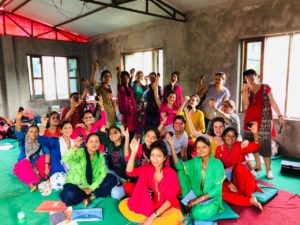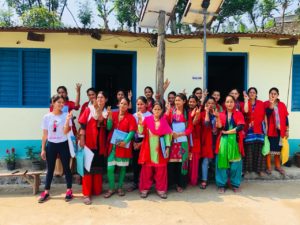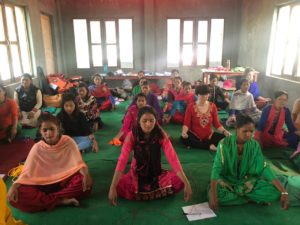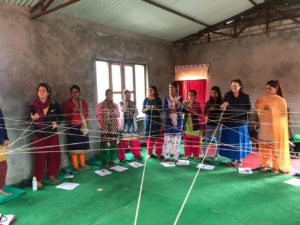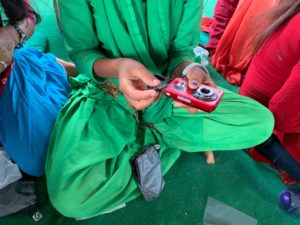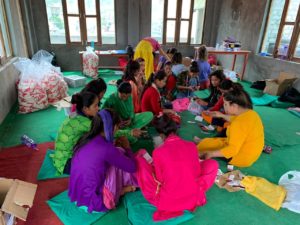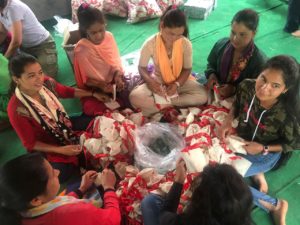We finally made our first trip to Achham. This year the team is huge. We are in Sanphebagar and we have 10 days of training for the trainers and mentors who will be providing workshops in schools in Achham this year.
Our great 2019 team:
· 5 foreign volunteers: Maisie, Anne, Claudia (nurse) Eleonora (anthropology student), and Beatriz (menstrual therapist)
· 2 project coordinators in Achham: Tejana, and Manisha
· 6 trainers: Hiunkala, Ganga, Dambara, Juna, Rohina, and Basanti
· 12 mentors: Tulsi, Manisha, Sangita, Lalita, Kamala, Goma, Bhagwati, Nita, Urmila, Rabina, Janaki, and Krishna
· 1 photographer: Uma
· 2 interns: Raunika, and Rupa (CEO assistent)
· CEO of the project: Clara
The buckets arrived two days later than expected and the menstrual cups also arrived late, but that’s how Nepal is. Luckily, everything arrived. We took advantage of the delay to prepare the routines and processes.
It is very important that the trainers know exactly what they will be teaching. However, they have not been to the school and have not done the workshops. It is for this reason that we have the mentors. The mentors are girls between the ages of 16 and 18 who attended the workshops in previous years in Mangalsen. They assist the trainers and are a great help.
On the third day, we met with the mentors and trainers in a small room at the hotel where we were staying. We went over what we will do during the first day of the workshops. We will present the project and play a game to help us bond. We will then discuss puberty, anatomy, and the menstrual cycle. We watched the film Monthlies, and taught the trainers how to use the projectors.
The next day, we went over what we would be doing on the second day of the workshops. We practiced the meditation we will do with the boys. The trainers practiced with us to gain confidence and it went very well. While the boys meditate outside, the girls will stay in class and write what they like and don’t like about menstruating. We will use this information to make a problem/solution tree. The mentors already know how to do this and will teach the trainers.
We continue with sex education, working as openly as possible because we know that the students at school are very curious and it is important that the trainers and mentors are prepared to respond to all types of questions. We also use questions from other years like, “How does a woman masturbate?”
We talk about sexually transmitted diseases and methods of contraception, putting emphasis on the use of condoms because in this area the HIV rate is very high. When we explain how to put condoms on, it creates a lot of laughter and helps everyone to relax.
We also talk about sex, gender, and sexual orientation, which is a taboo topic in Nepal. It took us a day longer than expected to finish the syllabus. We spent a lot of time planning the 6 days of the workshop. We went into detail about the menstrual cycle, the changes that come with it, and the tools we can use to keep track of it. We also discussed menstrual hygiene, menstrual products, pain management, and the importance of nutrition during the menstrual cycle.
We discussed the topic of photography with Uma, who taught the trainers so that they can later explain it to the girls at the schools.
We also taught them about the menstrual cup: what it is, how it works, and how to explain it easily.
Two guests from the Possible Health (a local NGO in the hospital) in Sanphebagar came to train the team in stress control and first aid. It will be the first time that some of these girls spend so much time away from home and it is important that they feel well.
On the seventh day, the trainers explained part of the syllabus so that we could go over it together and see what needed to be corrected. In the afternoon, Anne, with the help of Rupa and Raunika as translators, explained how to use the tablet. We all helped each other learn.
To help the team feel more confident, we went to practice at a school. The second day we practiced, everyone was less nervous and it went better. The trainers are getting more confident.
On the day that we had to leave, there were not any jeeps for us to take, so we took advantage of the extra time to go over the use of Kotolbox, the application that allows us to digitalize the data. The mentors upload the data so that it is in the cloud and can be used.
The last day we bought brownies for the team 🙂, there are brownies in Saphebagar!
There is still a lot of work left. We still have to go to the villages and teach workshops using the information learned during the training days, but we know that everything we do is important for these women.
Written by Beatriz San Roman and Clara Alberta Pinilla Photos by Clara Garcia Ortés. Translation by Maisei Still and Shae Citte
West Nepal girls need this kind of program. And we need help to continue the project!
Paypal recurring donations:
Or if you feel like it, you can donate via bank transfer at: Banc Sabadell IBAN: ES23 0081 0900 8200 0430 1934 BIC: BSABESBB (your recurring donation will help us have a better planning of our budget to carry out the projects undertaken).
Or take a look to others ways to donate at http://beartsy.org/get-involved-with-rato-baltin/ or https://beartsy.org/become-an-associate/
Thank You! 🙂

